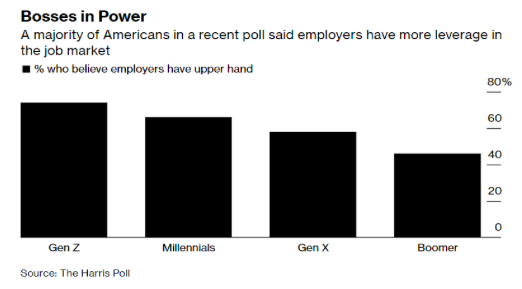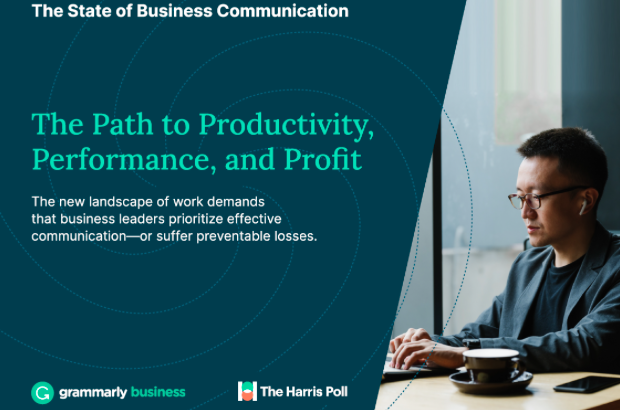Brief • 3 min Read
The latest trends in culture and society from The Harris Poll
The handcuffs might be coming off. Non-compete clauses restricting employees from switching jobs or starting their own companies could be history if a proposed FTC ban succeeds. This is welcome news to American workers as our ATW survey fielded February 24th to 26th among 1,966 U.S. adults finds one-third (33%) have signed a non-compete before, and (16%) have signed multiple ones. And nearly two-thirds (64%) of those who have signed one are currently bound by one with their employer.
The chief complaint is that non-competes have become onerous, stifling innovation and American competitiveness. But they also restrict individual mobility at a time when nearly half (43%) of employed Americans are worried about losing their job, and most believe their employers have more leverage: Harris Poll-Bloomberg survey.

Here’s what else you need to know this week:
- Americans remain worried about the economy and a looming recession until we get out of this interest rate raising/market falling cycle.
- Breaking up has become more complicated online, where password sharing with exes (and even stalking) is standard among younger Americans.
- Workplace communication still needs improvement, and it’s costing money and clients.
- Understaffing, paperwork, and insurance companies are burning out doctors and nurses. And they are growing less satisfied with their careers.
Lastly, check out the latest America This Week monthly summary slide deck and tabs. Download the new February report here.
Don’t Tell Americans The Economy Is Getting Better: MarketWatch-Harris Poll
Despite some relatively good economic news earlier this year, Americans remain deeply worried about the economy, according to our latest survey with MarketWatch.
- In January, 517,000 new jobs were added – more than double what was expected – and the unemployment rate dipped to (3.4%), the lowest figure since 1969. And the annual inflation rate, using the consumer-price index as the gauge, declined in January for a seventh consecutive month, reaching an annual rate of 6.4%.
- Yet economic worries persist: The Harris Poll-MarketWatch survey finds that nearly nine in ten Americans (87%) are concerned about the economy and inflation – a figure that has held steady over the past year.
- Additionally, (80%) are also worried about a potential U.S. economic recession, and a similar number (77%) believe it’s likely that the U.S. economy is headed into a recession this year.
Takeaway: Economic concern is “a big thing, and it’s overtaken COVID as the main driver of anxiety,” said Harris Poll co-CEO Will Johnson. For many Americans, it may not matter that economic trends are improving because “inflation is here, it’s real, and [you’re] seeing it everywhere.”
A Breakup Isn’t Forever Online: Norton-Harris Poll
It’s not as easy as getting your albums back when the internet is involved: Our latest survey with Norton in ConsumerAffairs and Moneylife finds many Americans (especially younger ones) are reckless online with breakups, including sharing passwords with their exes and not treating online stalking with much concern.
- Gen Z and Millennials have “concerningly relaxed” attitudes about online stalking. For example, one-third say they don’t care if they’re being stalked online by a current or former partner (34%, 35%) as long as they’re not tracked in person – three times higher than older adults (58+:10%).
- And Gen Z is making it even easier for online stalking: More than a third say they have shared passwords with an ex before.
- Online stalking goes beyond checking one’s location: Among those who have been in romantic relationships, nearly a fifth (16%) say that they’ve checked a current or former significant other’s phone to view texts, calls, direct messages, emails, or photos, (12%) have reviewed their former partner’s device search history, and (11%) have tracked a current or former partner’s location using a location sharing app.
- Security issues arise even before a relationship begins: One-quarter of Americans (25%) admitted to being the victim of an online dating or romance scam.
Takeaway: “This research is a wake-up call. The fact that so many Gen Z and Millennials think online stalking is acceptable tells us that more needs to be done to educate younger generations about the dangers,” said Kevin Roundy, senior technical director of Norton Labs. “There is an important distinction between curiosity, such as searching for someone online to learn more about them, versus invading someone’s privacy or stalking. These attitudes and behaviors are a slippery slope that could place people in real danger, whether the stalking is online or in-person.”
Another Year, Another Miscommunication: Grammarly-Harris Poll
In the second annual “State of Business Communication” report with Grammarly, effective comms is a challenge that keeps growing for American businesses and employees.
Download the report here.

- American workers now spend over (70%) of the workweek communicating on various channels, and (58%) wish they had better tools to be more effective, especially English as a second language (ESL) and younger employees (71%, Millennials: 65%, Gen Z: 63%).
- Employees spent (18%) more time communicating in writing (YoY), yet, business leaders report a (12% YoY) drop in the effectiveness of written communication over the same period – and (15%) cited more “decreased productivity” as a result.
- Miscommunications aren’t without consequences: Over eight in ten business leaders (84%) feel the downsides of poor communication, with lower productivity, missed deadlines, and increased costs ranking as the top three.
- Grow – or sacrifice – revenue and results based on communication: Effective communication drives higher internal and external performance, with increased productivity (72%) and customer satisfaction (63%) topping leaders’ outcomes.
Takeaway: “The research is clear: Leaders who shrug off the massive impact of poor communication on their bottom line will lose,” said Matt Rosenberg, Grammarly’s Chief Revenue Officer and Head of Grammarly Business. “Last year, we found ineffective communication costs U.S. businesses up to $1.2 trillion annually, or $12,506 per employee. This year’s report shows the problem is worsening with a greater impact on everything from operational efficiency to employee and customer satisfaction. At a time when the stakes are critically high, leaders who invest in empowering efficient, consistent communication across their organizations will see results and profits climb.”
Doctors and Nurses Are Burnt Out: HealthDay-Harris Poll
America’s healthcare workforce is under unprecedented strain, and leaders of the medical profession are scrambling to shore up doctors and nurses who are burning out in record numbers, according to our latest survey with HealthDay, as featured in U.S. News.
- Nearly two-thirds (63%) of a nationwide group of doctors and nurses said they are experiencing a moderate or great deal of burnout at work.
- Staffing shortages and paperwork are leading causes of burnout: Around 7 in 10 primary care physicians and nurses cite understaffing as the most significant contributor to burnout (66% and 75%, respectively), along with the amount of daily paperwork (58%, 51%).
- Many also cite their time communicating with insurance companies on their patients’ behalf as a source of burnout (primary care physicians: 38%, nurses: 20%).
- The troubling trend of decreased satisfaction among medical professionals: “A year ago, (40%) of physicians felt highly satisfied,” said Dr. Christine Sinksy, vice president of professional satisfaction at the American Medical Association, “a year later, it’s only (22%) today.”
Takeaway: “Even before COVID, about 40% and up to 50% of doctors and nurses are reporting burnout, distress, anxiety,” Dr. Victor Dzau, president of the National Academy of Medicine, told HealthDay Now. “And since COVID, the numbers have increased to 70 to 90″.” The high levels of burnout may have continued consequences on staffing numbers, as it might warn away potential healthcare professionals when they find out” “only (57%) of doctors say they would choose medicine as a profession again, compared with (72%) the year before, says Dr. Sinsky.
Subscribe for more Insights
Subscribe to our newsletter for the latest trends in business, politics, culture, and more.
Download the Data
This survey was conducted online within the U.S. by The Harris Poll from February 24th to 26th among a nationally representative sample of 1,966 U.S. adults.
Download
Subscribe for more Insights
Subscribe to our newsletter for the latest trends in business, politics, culture, and more.
Download the Data
This survey was conducted online within the U.S. by The Harris Poll from February 24th to 26th among a nationally representative sample of 1,966 U.S. adults.
DownloadRelated Content








